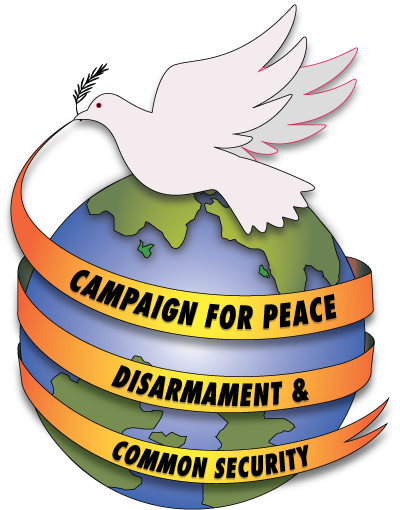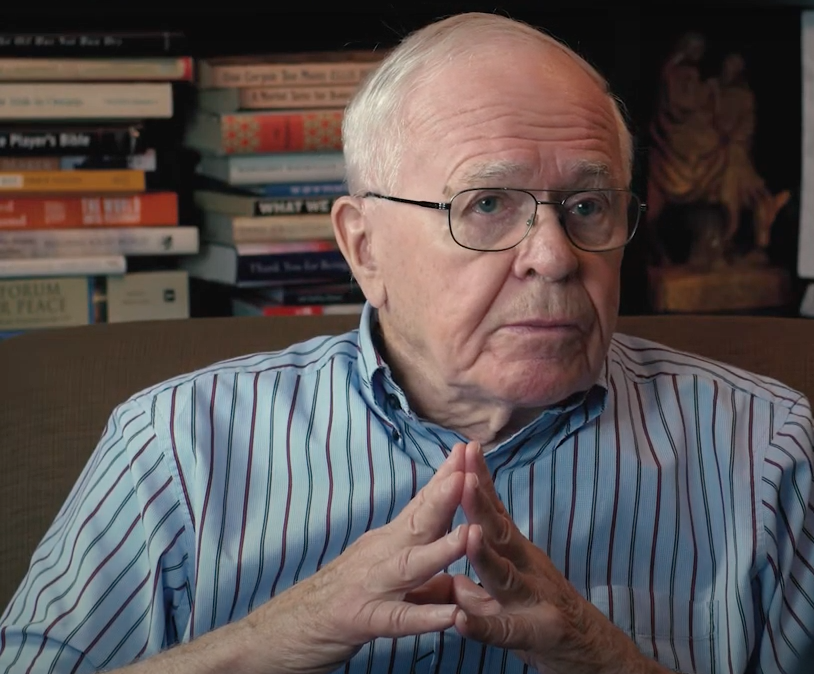Former Canadian Disarmament Ambassador Douglas Roche’s speech at the MacBride Peace Prize ceremony for Hiroshi Taka, spoke of the urgency of confronting the specter of nuclear war arising from the Ukraine War, where disarmament initiatives of the past 50 years went wrong, the urgent need to reinforce the Nuclear Nonproliferation Treaty and build on the Treaty on Prohibition of Nuclear Weapons, celebrates the work of Gensuikyo, the Japan Council against A- & H- Bombs.
Address by Hon. Douglas Roche, O.C.
to IPB Ceremony Awarding Sean MacBride Peace Prize
to Hiroshi Taka, October 16, 2022
Dear Hiroshi Taka,
It is an honour to salute you on the occasion of your receiving the prestigious Sean MacBride Peace Prize for your distinguished work as Executive Director of Gensuikyo, a central organization of the Japanese peace movement and one of the essential organizers of the worldwide peace congresses in Hiroshima and Nagasaki.
I speak today to you and our friends in the world-wide peace movement as an Honourary Citizen of Hiroshima. Hiroshima and Nagasaki represent the supreme tragedy of humanity, which must never be repeated. You, Taka, and your colleagues in Gensuikyo, have stayed faithful through the years to the pledge of “Never Again!”
Unfortunately, at this very moment, we live under a Russian threat to use nuclear weapons in the Ukraine war. The magnitude of the present crisis cannot be overstated. The sudden realization that nuclear weapons could be used has shaken public confidence in security systems. The risk of nuclear war has never been higher.
Where did the world go wrong in getting to this fraught moment?
It went wrong in using the atomic bomb in 1945 against Hiroshima and Nagasaki. It went wrong immediately after the horrendous first use in failing to construct international legal machinery to ban the development and possession of nuclear weapons. It went wrong when the major states built their military doctrines on the strategy of nuclear deterrence, which promised mutual assured destruction, and led to a nuclear arms race. It went wrong in not enforcing the obligation, under the Non-Proliferation Treaty, to pursue comprehensive negotiations for the elimination of nuclear weapons. It went wrong when, after the Cold War, NATO, a nuclear-armed alliance, virtually encircled Russia. It went wrong when the nuclear states began their modernization programs, which steal money that should go to the U.N. Sustainable Development Goals.
Today’s nuclear weapons crisis has many fathers. The political system is bogged down in casting blame. Several arms control treaties have been abandoned. There is no trust. The nuclear disarmament regime is in chaos. At the very moment when the world needs to pull together to deal with the covid and climate crises, the re-militarization of our societies is taking place. The only winners today are the military-industrial complex.
So we must turn our attention immediately to what we are going to do to remove the spectre of nuclear war. What must be our priorities?
First, of course, must be to stop the madness of the Ukraine war. All world leaders must demand a diplomatic resolution of this conflict.
The problem of nuclear weapons must be brought back to the centre of the political stage instead of being shunted off to the sidelines. The Ukraine war has shown how vital it is to maintain international machinery for peace and to abolish nuclear weapons. It is in everyone’s interests to do so.
The Non-Proliferation Treaty must be strengthened. This can be done by reaffirming the commitment by all states parties to the full and effective implementation of Article VI of the Treaty, and the unequivocal undertaking by the nuclear-weapon states to accomplish the total elimination of their nuclear arsenals leading to nuclear disarmament.
The deterioration of nuclear disarmament in recent years must be overcome by a new commitment, as was agreed in 2010, “to establish the necessary framework to achieve and maintain a world without nuclear weapons.” This should include comprehensive negotiations on a nuclear weapons convention or a framework of mutually reinforcing instruments backed by a strong system of verification.
It is precisely because past commitments have been so blatantly ignored that the Treaty on the Prohibition of Nuclear Weapons (TPNW) came into existence. In unequivocal language, the TPNW declares that “any use of nuclear weapons would be abhorrent to the principles of humanity and the dictates of public conscience.” This historic treaty, now ratified by 60 states, exposes and
stigmatizes nuclear weapons and their use as standing outside the norms of international humanitarian law. It challenges nuclear weapons states to finally act on their NPT commitments.
Taka, your work on these issues for more than 50 years and your development of Gensuikyo has inspired countless persons around the world. The Japan Council Against Atomic and Hydrogen Bombs, a federated body of 60 national organizations with a combined membership of 2.5 million persons, has brought valuable petitions to the U.N. We must thank Gensuikyo delegations for their regular travel to UN headquarters in New York to follow the First Committee debate on disarmament issues where they dialogue with delegates of Member States to promote the adoption of resolutions seeking the elimination of nuclear weapons.
I congratulate you for such valuable work and I also commend the International Peace Bureau for its wisdom in selecting you as a recipient of the Sean MacBride Peace Prize. Both you and I want the IPB’s role to grow as a bridge between grassroots people and the global cause of peace, justice and a sustainable world free of nuclear weapons. This work has never been more vital.

